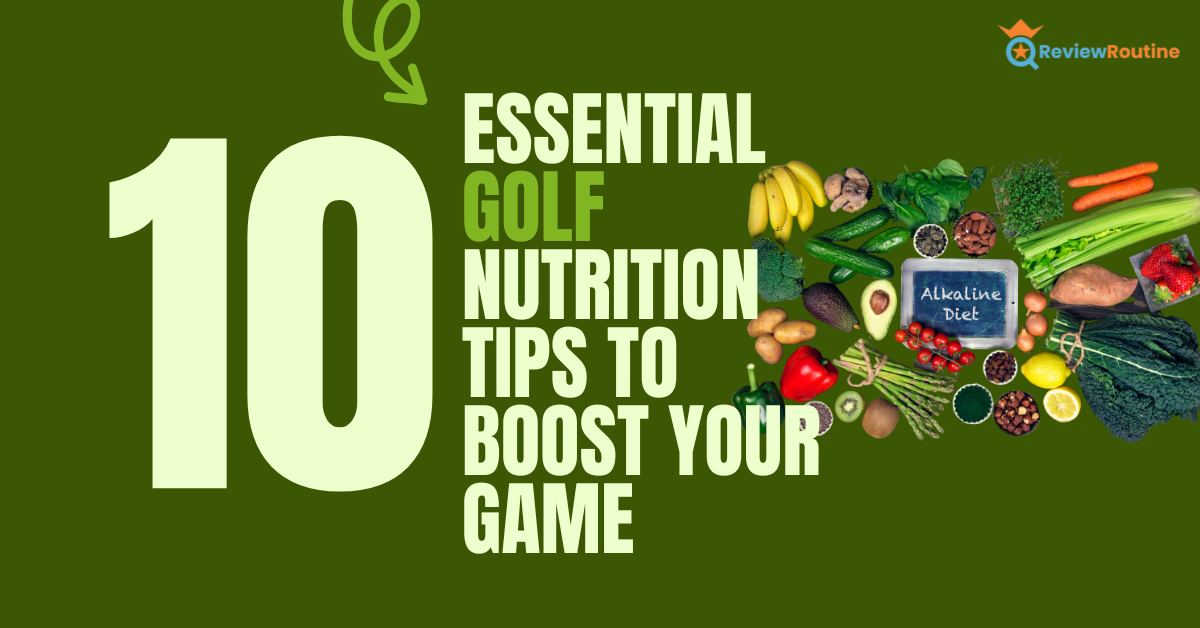Golf is a sport that requires both physical and mental stamina, and nutrition plays a critical role in supporting optimal performance on the course. Whether you're a seasoned pro or a recreational player, fueling your body with the proper nutrients can help you maintain energy levels, stay focused, and perform your best.
But with so much conflicting information, knowing what to eat and when can be challenging. That's why we've compiled a list of top golf nutrition tips to help you fuel your body for success on the course.
From choosing healthy snacks to staying hydrated, we've got you covered. So grab your clubs, and let's get into the world of golf nutrition!

1. Drink Coffee in Moderation
For many people, a cup of coffee is essential to their morning routine, but is it beneficial for golfers? The answer is yes, as long as it's consumed in moderation. According to sports nutritionist Krista Austin, a pre-round cup of coffee is a great way to increase your energy levels and can even contribute to your hydration goals.
However, it's essential to stick to the recommended daily caffeine intake of up to 400mg and to finish your coffee at least an hour before your round to avoid feeling jittery or anxious. Changing your coffee order to a 16-ounce latte with low-fat or skim milk can also provide up to 16 grams of protein to help sustain your energy throughout your game.

2. Eat Breakfast
Eating a nutritious breakfast is essential for golfers, as it helps to maintain steady energy levels and prevent overeating later in the day. Skipping breakfast can lead to hunger pangs during your round, affecting your concentration and overall performance.
According to the Dietary Guidelines for Americans, eating a balanced breakfast within 30 minutes to an hour after waking up is recommended to fuel your body for the day ahead. Establishing a pattern of not skipping meals in the morning can also help you make better choices throughout the day, especially when snacking during your round.
3. Balance Carbs and Protein
In addition to eating breakfast, balancing your carbohydrate and protein intake is crucial in maintaining energy levels during a round of golf. While complex carbohydrates provide quick bursts of energy, consuming them alone can cause a spike in blood sugar levels, followed by a crash. This is where lean proteins come in, as they can help slow down carbs' absorption, keeping you feeling satisfied and energized throughout your round.
Aim for a 2-to-1 ratio of protein to carbs when choosing snacks or meals, such as almond butter with whole-grain bread or a protein smoothie with low glycemic index carbohydrates. This combination will also help to stabilize your energy levels, preventing muscle spasms and maintaining muscle mass.

4. Snack Smart
Smart snacking during your golf round can help maintain your energy levels and prevent hunger pangs. When choosing snacks, choose options high in protein, fiber, and healthy fat. Dried cheese snacks, like dried parmesan, are a great option as they are high in protein and can provide some sustenance during your round.
A piece of fruit, a pack of unsweetened dried fruit, or a pack of nuts can also provide steady energy and help you feel satisfied throughout your game. Nut butter, like almond butter, is another excellent option as they are high in protein and healthy fats, and can be paired with whole-grain bread for a balanced snack. By snacking smart, you can maintain energy and focus throughout your round.
5. Stay Hydrated
Staying hydrated is crucial for golfers, especially during hot weather conditions. Drinking enough water on the course can help maintain your focus, and energy levels, aid digestion, and prevent dehydration. The American Council on Exercise recommends drinking at least 17-20 ounces of water two hours before exercising and then 7-10 ounces every 10-20 minutes during your round to replenish fluids lost through sweating.
To ensure you stay hydrated, carry liquids in your golf bag and sip water consistently throughout your round. If you're playing in extremely hot weather, consider adding sports drinks or electrolyte replacements to help replace lost electrolytes and fluids. Staying hydrated is vital to maintaining your performance and preventing heat-related illnesses.

6. Plan Ahead
If you're a frequent traveler for golf, planning and preparing nutritious meals in advance is essential for maintaining a healthy diet. Learning basic cooking skills can help you make better food choices on the go and ensure you have access to nutritious meals that will fuel your game.
Consider packing non-perishable snacks like nuts and dried fruits, and opt for healthier meal choices, such as lean proteins and whole grains, when eating out. By planning and making wise choices, you can stay on track with your nutrition goals, even when you're on the road.
7. Watch Your Caffeine Intake
If you're considering using caffeine to aid your concentration during a game, it's essential to be cautious and seek advice from an Accredited Sports Dietitian. Before a round, consuming small amounts of caffeine, like coffee, can help increase energy levels and contribute to hydration goals.
Still, it's recommended to stick to the recommended daily caffeine intake and finish your coffee at least an hour before your round. Consulting a professional can help you determine the ideal dose for your body type and avoid adverse side effects.

8. Eat Pre- And Post-game Meals
To ensure optimal performance during a golf game, it's essential to fuel your body with the proper nutrients through pre- and post-game meals. Eating a nutritious meal before starting your game, like whole-grain bread with almond butter or a grainy wrap with cheese, chicken, and salad, can help maintain steady blood sugar and energy levels throughout your round.
Additionally, consuming recovery foods after your game with carbohydrates, protein, and fluids, like a fruit-based smoothie or a ham and salad sandwich, can help replace sweat losses and aid in muscle recovery. You can boost your performance and recover faster by paying attention to your pre- and post-game nutrition.

9. Choose Low Glycemic Index Carbs
When it comes to fuelling your body for training and competition, choosing the right carbohydrates is essential. Low glycemic complex carbohydrate options like brown rice, multigrain bread, porridge, or baked beans are excellent choices as they provide sustained energy and prevent fatigue over long training and competition days.
These options take longer to digest, which means they offer a steady release of energy throughout the day. By opting for these choices, you can ensure you have the power to perform your best and prevent crashing during long days of training or competition.

10. Seek Individualized Nutrition Advice
It's important to remember that every athlete is unique and has different nutritional needs. That's why seeking individualized nutrition advice from an Accredited Sports Dietitian is critical to developing a tailored nutrition plan that works best for you. A sports dietitian can assess your needs based on your training load, training goals, body composition goals, health, and growth adjustments for younger athletes.
A personalized nutrition plan can optimize your performance, prevent injuries, and support your overall health and well-being. So don't hesitate to seek the advice of a professional and take your game to the next level!

The Bottom Line
Proper nutrition is essential for golfers to stabilize energy levels, focus, and overall health during long rounds and training sessions. To optimize performance, golfers should prioritize balanced meals, smart snacking, hydration, and seeking individualized nutrition advice from Accredited Sports Dietitians.
With these tips in mind, golfers can fuel their bodies for success on the course and maintain a healthy lifestyle off the golf course. Remember to plan and make small, sustainable changes to your nutrition routine for long-term benefits.








